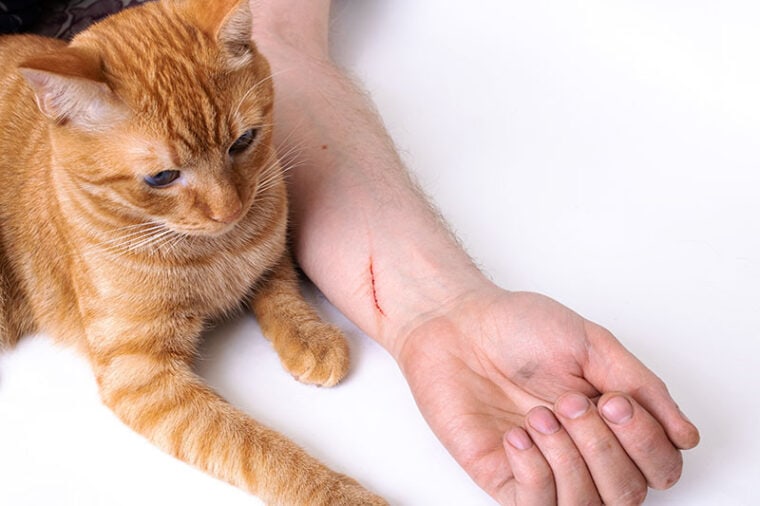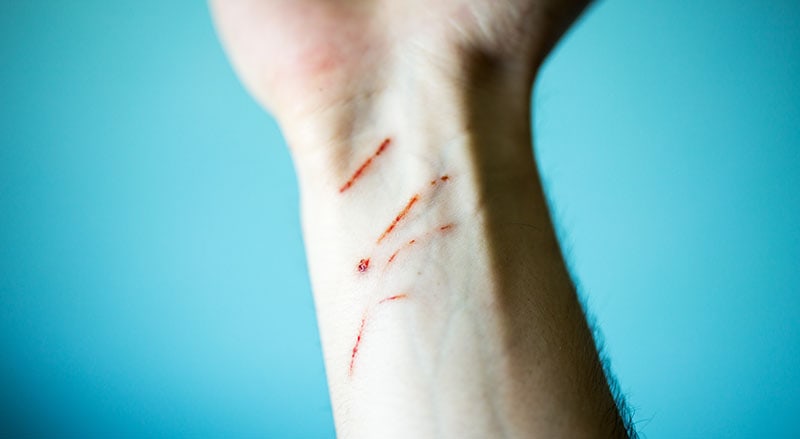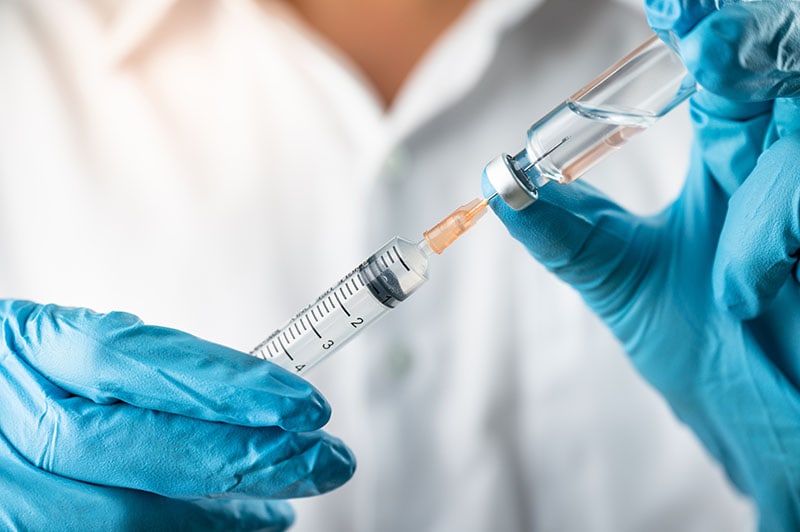
Cats have sharp claws that they use constantly; scratching is an inevitable instinctive behavior that they can’t control. So, although it should be avoided at all costs, during playtime, many cat parents may end up with scratches all over their bodies.
While some people may have a mild reaction to a cat scratch, others may feel itchy in the area to the point that the itching is severe and causes further problems. Usually, mild itchiness is normal because the skin is inflamed and irritated, but it could also indicate an infection, so make sure you consult with your doctor anytime you get a cat scratch that looks red, hot, inflamed, wet, or markedly itchy.
This article goes over why cat scratches itch, if they’re harmful to our health, and how we can protect ourselves from getting new scratches and prevent our cats from scratching us in the first place.
Important Note: Whenever you get scratched by a cat, you should clean the wound with soap and water and hold it under running water for a few minutes. If the wound is bleeding you should apply gentle pressure to it for a couple of minutes with a clean or sterile gauze until the bleeding stops. Lift the swab and do not rub the wound afterwards since, otherwise, you will disturb the clotting process again. Dry the wound well and cover it up if necessary. Contact your doctor for further advice. If the scratch is deep, the cat is stray, or if the person scratched is a child, elderly, or immunocompromised individual, it is especially important to consult with a medical professional.
The 5 Reasons That Your Skin May Itch After a Cat Scratches You
1. Normal Reaction to Skin Healing
Whenever you have a wound or a scratch on your body, whether your cat scratched you or you touched something sharp, the skin will immediately start to heal after the incident.
Cat scratches can be superficial or cut deep into your skin and bleed. After your skin gets injured or starts to bleed, the different cells and blood components will start to (activate) clump and clot,1 eventually forming into a dry scab, which may lead to itching.
This type of itching after you’ve been scratched by your cat is an entirely normal reaction to your skin healing, and it shouldn’t alarm you as long as it is mild and your skin has no signs of infection.

2. Skin Barrier Disruption
Anything that creates a tear in the skin, including cat scratches, causes cells to release inflammatory particles and molecules. These activate particular itch-associated nerve fibers, which is why any skin barrier disruption could lead to itching.2
This is a natural process, but the itching sensation in people may vary from extremely mild to extremely severe. Those with pre-existing skin conditions typically tend to feel itchier than people without skin problems.
While it may be tempting to scratch your itching cat wound, it’s best not to touch the scratch at all. Scratching a fresh wound could lead to more itchiness and possible bacterial infections.
3. Infection
Even indoor cat’s claws carry bacteria. They use their paws and claws to scratch the litter box, maybe play with a flower pot, or simply walk around the house. When a cat scratches you, some of these bacteria can get to your skin and multiply.
The presence of bacteria will trigger your body’s response and a cascade of defensive blood cells will be released. The inflammation that naturally occurs as part of the protective mechanism will cause an itchy sensation at the wound site.

4. Cat Allergy
Pet allergies are common, and many people worldwide are allergic to cats or more specifically, the protein found in cat saliva and sebaceous glands.
If you suffer from cat allergies and get scratched by a cat, you’ll likely experience more itching than a non-allergic person would. In many cases, if you get scratched by a cat and are allergic, your doctor will prescribe antihistamines to reduce your reaction.
5. Cat Scratch Disease (CSD)
Cat injuries can cause cat scratch disease, a bacterial infection (Bartonella henselae) that causes serious generalized signs and itching at the wound site. These bacteria are typically passed on to humans through scratches and bites but can also infect you if a cat licks your open wound.
Several risk factors may increase the risk of getting contaminated with this disease:
When a person suffers from CSD, they will likely experience the following signs and symptoms:

Are Cat Scratches Harmful to Our Health?
Cat scratches are generally not too harmful but they’re also not entirely safe. Sometimes, you may not even feel that your feline scratched you. Other times, the scratch may be severe and lead to CSD or other bacterial infections.
Cat scratches can harm human health because they can transmit diseases, parasites, and fungi. Health problems that you could experience after getting scratched by a cat include:

How Can I Protect Myself From Cat Scratches?
Although there’s no way to remain entirely safe from cat scratches if you own a cat, there are things that you can do to reduce the chances of getting scratched:
Final Thoughts
Cat scratches may itch due to several reasons. Typically, they itch as a normal sign of wound healing and as a reaction to skin barrier disruption. However, if the itching is severe and continuous and the wound looks red and swollen, there’s a possibility that your cat transferred a bacterial infection or cat scratch disease to you. Be sure to clean the wounds thoroughly and contact your doctor so that scratches never become a problem.
Since the chances of cat scratches are higher for people who own cats, it’s best to be careful when handling your feline and ensure that you protect yourself from scratches as much as possible.
Featured Image Credit: Vera Aksionava, Shutterstock





